- Paul Ehrlich: Stanford University Professor and co-author of “Ecoscience”
- The Club of Rome: a global think tank made up of a group of concerned “world citizens” whose members have included many high-ranking members of government, business, finance and academia.
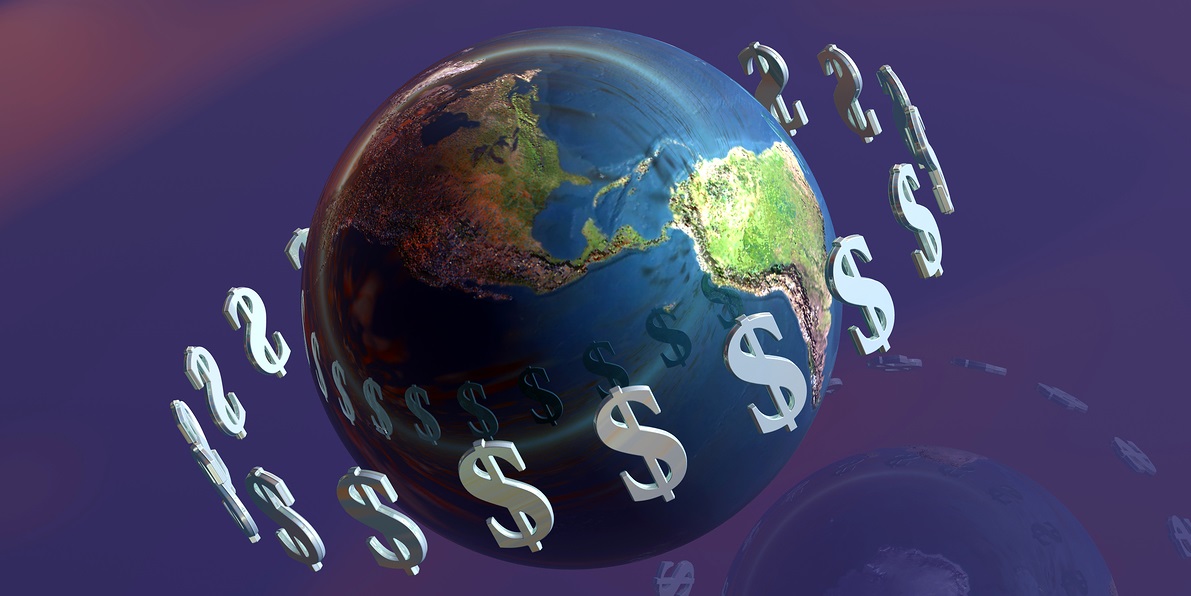
bigstockphoto_money_makes_the_world_go_aroun_300538.jpg
(This article is a re-publish from 2015)
At an Academy Awards Ceremony full of controversy, the world saw Hollywood stalwart, Leonardo DiCaprio finally receive the Oscar that had alluded him for so long. However, instead of the typical acceptance speech where the recipient goes up and thanks a bunch of people, DiCaprio took this opportunity to once again pontificate about man-made Climate Change. This came just over two months after the world saw 151 world leaders, along with some 39,850 other diplomats, policy experts, activists and journalists convene in Paris for the 21st Conference of the Parties to the UN Framework Convention on Climate Change, a.k.a., the U.N. Climate Summit.
The public purpose for this meeting was to come up with solutions to solve the problem of “Climate Change”. After the summit was completed, one of the many “solutions” which were agreed upon was a “shift away from fossil fuels”. This is quite interesting given who sponsored the COP21 Climate Summit. The 2015 UN Climate Summit had over 50 corporate sponsors hosting the event including Google, 3M, Puma and IKEA. These corporate sponsors also included major international oil companies like Dutch Royal Shell, British Petroleum (BP), and Chevron.
Back over the holidays I was visiting a friend’s family in Wyoming, which in recent years had a large boom with natural gas and oil reserves, along with its rich coal deposits. My friend’s father works as a trucker hauling oil and gas. We talked about how the manipulation of oil prices to artificially low rates by OPEC had stagnated what had been a thriving economy in that part of the country. For those not familiar, OPEC is a group of oil-producing nations out of the Middle East like Saudi Arabia, Kuwait and Qatar, along with the international oil companies that work with them like Dutch Royal Shell and BP. This relationship between the Arab elites and the Anglo oil barons was initially established at the turn of the last century through the British Imperial ventures into the Middle East. Since then, it has been a major powerhouse on the global economic stage.
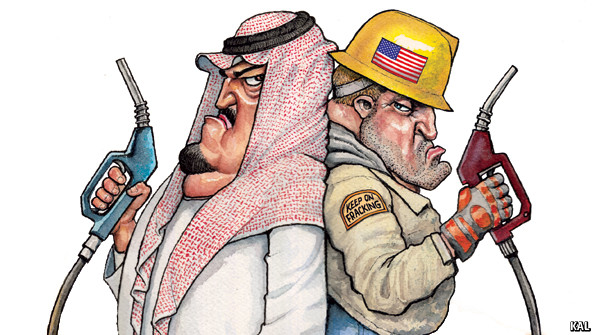
http://www.economist.com/news/leaders/21635472-economics-oil-have-changed-some-businesses-will-go-bust-market-will-be
This relationship was continued by the American arm of the Anglo-American establishment, when former Secretary of State Henry Kissinger made a deal with the oil-producing Arab states that the United States would not compete on the international market with its own vast oil and gas reserves in the 1970s. This was done to ensure continued Arab cooperation with Anglo-American geopolitical goals in the Middle East (particularly when it comes to keeping Russia out), as well as support for the State of Israel. Recently, U.S. Congressional leaders passed legislation effectively revoking this deal to keep American oil and gas off the international market, allowing these smaller companies to compete. However, with the recent “decree” at the UN Climate Summit, it would appear that the international oil conglomerates along with our own President Obama, shot the foot off these American oil and gas companies before they had the chance to compete on the international energy market.
The use of government support to gain advantage in the market is nothing new here in the U.S. One may recall the debate that was going on surround the whole Keystone Pipeline, and the environmental concerns raised and then later echoed by President Obama. You may also remember the media portraying the “villains” of that whole debate as being the infamous Koch brothers, who run the country’s largest private (as in not traded on Wall Street) corporate conglomerate. What is not well known is that the real “fight” was about who was going to control the transport of the oil. The Kochs wanted to use the pipeline to funnel the oil to their refineries, while billionaire (and largest individual recipient of Federal bailout money) Warren Buffet, wanted to transport it on his rail lines. Warren Buffet has been a large financial donor of the Democratic Party and President Obama, so his voice was louder. An interesting note though, was that it was actually Charles Koch who launched the political careers of Bill Clinton and Al Gore, as he was once a major Democratic donor, before buying up the Neocon/GOP side of the aisle. For corporate power players, it is about whose policies will be best for business, not the actual political ideologies the politicians claim to espouse- that stuff is for the common folk.
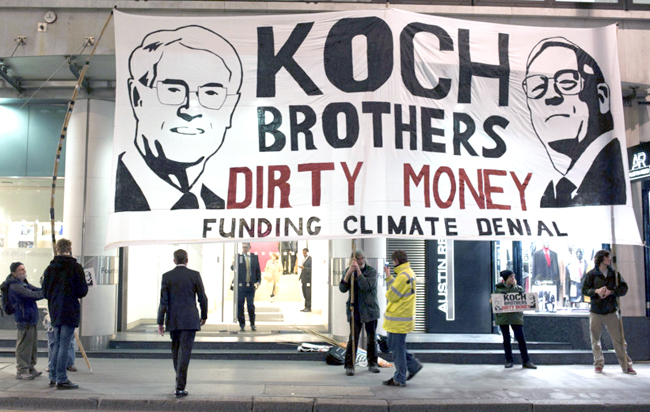
The “fossil fuel” sponsorship of the Climate Summit was jeered at by critics who saw the move as a “conflict of interest”, however, I would tend to disagree with that. If one looks at the bigger picture as a desire for a monopolistic control of the evolving energy market, and whatever technologies stem from that, then it is in the interest of these companies to get behind legislation and initiatives that will make it harder for others to survive and compete in the marketplace. In order to have a monopoly, you must first crush your competition. This was the purpose of the Obama Administration’s “War on Coal”, which was carried out through increasingly stiff EPA regulations, forcing American coal plants to shut down by the thousands, while driving up the cost of electricity to the American consumer. Coal is a major competitor to the international oil companies who finance much of the modern “green movement”.
However, General Electric, one of the largest energy corporations in the world and producer of coal-powered electricity, has thrived under the Obama Administration. GE Chairman and CEO Jeffrey Immelt was appointed to head of the President’s Council on Jobs and Competitiveness. GE is one of the largest producers of wind turbines in the world, and recently opened the largest solar panel production facility in the United States. GE’s power plants have raked in profits as Obama’s “War on Coal” crushed its less-wealthy competitors.
This is how crony capitalism works, with select insider corporations using their wealth and influence to secure government contracts. It is these international energy interests that lobby Congress and the Executive Branch to create laws and regulations that will squeeze out their competition and allow them to maintain their control over the energy market. Even if the legislation includes fees and penalties to give the public impression of a “crackdown” on climate polluters and are enough to potentially bankrupt less wealthy competition; the fees will tend to amount to little more than “a drop in the bucket” for an unfathomably wealthy megacorporation like GE.
An article out of Reuters points out the fact at the World Gas Conference this past June (also held in Paris), Shell, BP and other big European and international oil companies “sent a joint letter to the U.N… calling for measures to push up the cost of burning coal, which remains fairly cheap. The companies suggest governments could either tax carbon emissions directly or reduce the supply of carbon-emission credits, required to offset emissions, to make those credits pricier on the secondary market.”
This idea of taxing carbon emissions has been around for a long time. It also goes hand-in-hand with the carbon offsets and carbon credits that are traded on the market in a similar fashion as derivatives, credit default swaps, and other bizarre and fundamentally worthless things used by investors and hedge fund managers to make ridiculous amounts of money for producing nothing. This system has its origins with the notorious Enron corporation and a meeting in the Oval Office back in August of 1997 where President Bill Clinton and Vice President Al Gore met with former CEO of Enron, Ken Lay, and former CEO of BP, Lord John Browne. This was before both Lay and Browne and their companies became immersed in scandal. The purpose of the meeting was to develop strategies for the upcoming Climate Summit in Kyoto that year.
Hopes and expectations among the environmental activist community were high for Kyoto, but EU Environment Commissioner Margot Wallstroem made it clear what the real intentions established at the Kyoto Climate Summit and by the resulting treaty were:
"[Kyoto protocol] is not a simple environmental issue, where you can say scientists are not unanimous. This is about international relations, this is about the economy, about trying to create a level playing field for big businesses throughout the world. You have to understand what is at stake, and that is why it is serious..." Despite the scandal involving Enron and the U.S. Senate refusing to ratify the Kyoto Climate Treaty, the carbon market was launched with the conclusion of the summit. After a failed run for president, carbon investor Al Gore devoted his time heavily promoting the need for this “cap-and-trade” system with his film “An Inconvenient Truth” and his subsequent speaking tour. Of course, one might say (as Al Gore has) that making money off a “good idea” isn’t a bad thing.
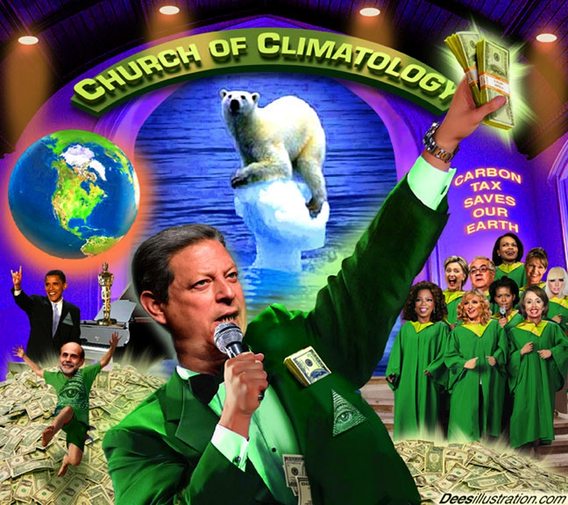
photo copyright David DeesHowever folks in Africa may disagree with Al Gore. An article out of the New York Times in 2011 entitled “In Scramble for Land, Group Says, Company Pushed Ugandans Out” describes a little-discussed consequence of the carbon-offset business:
“Across Africa, some of the world’s poorest people have been thrown off land to make way for foreign investors, often uprooting local farmers so that food can be grown on a commercial scale and shipped to richer countries overseas.
But in this case, the government and the company said the settlers were illegal and evicted for a good cause: to protect the environment and help fight global warming.
The case twists around an emerging multibillion-dollar market trading carbon-credits under the Kyoto Protocol, which contains mechanisms for outsourcing environmental protection to developing nations.
The company involved, New Forests Company, grows forests in African countries with the purpose of selling credits from the carbon-dioxide its trees soak up to polluters abroad. Its investors include the World Bank, through its private investment arm, and the Hong Kong and Shanghai Banking Corporation, HSBC.
In 2005, the Ugandan government granted New Forests a 50-year license to grow pine and eucalyptus forests in three districts, and the company has applied to the United Nations to trade under the mechanism. The company expects that it could earn up to $1.8 million a year.
But there was just one problem: people were living on the land where the company wanted to plant trees. Indeed, they had been there a while.”
The article describes people being beaten and villages burnt down, regardless of whether or not the residents had evacuated. Meanwhile, African nations are restricted from developing cheap coal-powered electricity and are given barely functioning solar panels to run hospitals. This has been a consistent policy towards the developing world, which was articulated by former California governor, Jerry Brown, when he stated that “It’s not viable for the poverty stricken developing world to emulate the prosperity of the US.”

Similar sentiments have been echoed by academics like UK professor Maurice King:
“Global Sustainability requires the deliberate quest of poverty, reduced resource consumption and set levels of mortality control.”
Of course, there’s always the option of “safe” and CO2 friendly nuclear power as South Africa has chosen to do. It seems to be a clear politically scientific consensus that carbon dioxide (which plants breathe) is FAR more dangerous and harmful to the planet than nuclear explosions and radioactive fallout...
In any event, while the U.S. has been as a whole reluctant to partake in the business plan of foreign oil companies, nations like the European Union and Australia went “all-in” with the CO2 “reduction” business, which has become a multi-billion dollar industry. Investment banking powerhouses like Goldman-Sachs and the Jewish-European Rothschild banking dynasty, are leaders in the global carbon market. Meanwhile we have folks like the charismatic David de Rothschild as an "environmental storyteller", creating books about the dangers of climate change for children.

Rothschild interests have also been vocal about the need to establish a carbon tax and a sort of global carbon-regulation system. Back in 2008, Simon Linnett, Executive Vice-Chairman of Rothschild, called for a new international body to regulate carbon trading. In his paper “Trading Emissions, for the Social Market Foundation”, Linnett applauded “cap-and-trade” and proposed the release of national sovereignty to combat “Climate Change”:
“As a banker, I also welcome the fact that the 'cap-and-trade' system is becoming the dominant methodology for CO2 control. Unlike taxation, or plain regulation, cap-and-trade offers the greatest scope for private sector involvement and innovation.
Furthermore, taxation and regulation can only be levied at local or national levels, whereas cap-and-trade can operate on a global level. And remember, the problem is global.
But for the private sector to participate enthusiastically in a global carbon trading market, governments must collectively establish a robust framework within which trading can occur. It must be long, loud and legal:
- Long: it is going to be around for a long time;
- Loud: it will be the dominant mechanism for sponsoring changes in behaviour and we are going to make this perfectly clear to the world's people; and
- Legal: we will enforce it through law.
As an aside, it is interesting to note that Rothschild-owned RIT Capital actually recently completed a major merger with Rockefeller Financial Services. For those not familiar, it was the old Rockefeller Standard Oil Company that was broken up at the beginning of the 20th century, becoming, among other things, Exxon-Mobil. There was recently some schism between the family and Exxon as the Rockefellers are staunch advocates of the “greening” of big oil, while the board members of Exxon have been somewhat resistant to going “all-in” with this plan. Hence we see the demonization in the media of this oil giant almost exclusively, and the recent rumors that “Toward the end of the 1980s, Exxon curtailed its carbon dioxide research... (and) worked instead at the forefront of climate denial.” have led to the company being subpoenaed for the "crime" of climate change denial.
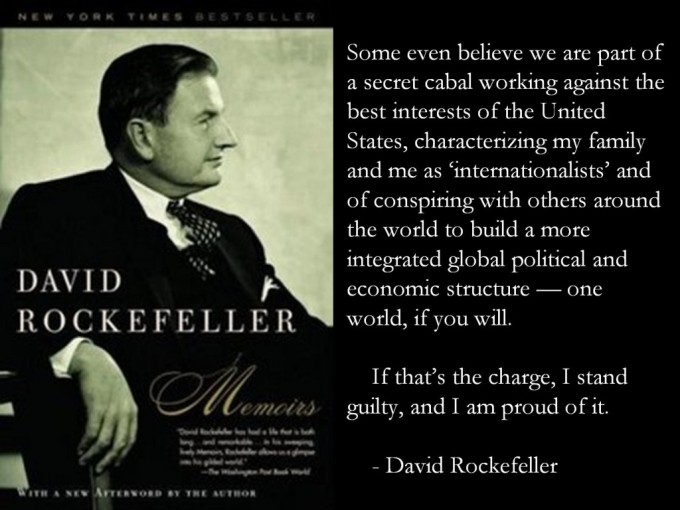
Other big-money names are also cashing in on the climate change business, like Jewish-American billionaire Michael Bloomberg, who owning a data company focused on energy investment and carbon markets research. Bloomberg was also anointed Special Envoy for Cities and Climate Change, by U.N. Secretary General Ban-Ki Moon, where he consults with mayors and related key stakeholders to raise political will and mobilize action among cities as part of a long-term strategy to advance efforts on climate change. This is part of the U.N. Sustainable Development Agenda 21, which is a subject worthy of its own article.
This past December in Paris, we saw great strides toward this goal of “subordination of national interests to this world initiative”. However, given the enormous financial power as well as the somewhat dubious past-dealings of the players involved, one would be right to be more than a little skeptical of all of this. If one takes away the “sky-is-falling” scenario drummed up in the corporate-government sponsored media and academia, what we have going on is quite similar to the international trade deals like the TPP, which essentially hand over national sovereignty to global corporate interests and their front-groups.
Likewise, the “carbon tax” that is continually being proposed by these international banking interests will no doubt be collected in a similar manner to income taxes in most western nations- which is through the enforcement agencies of central banks owned by private banking interests. Regardless of one’s views on the “science” of “Climate Change”, a great many climate activists feel a global carbon tax would essentially be little more than a Ponzi scheme cooked up by international finance to profit off taxation of human activity, while doing little to remedy actual pollution.
At the end of the day, oil and other “fossil fuels” are on their way out with or without government assistance, but how this happens is being artificially manipulated to make sure it stays a “closed system”- that is making sure that energy cannot be independent of the control of a select few. Likewise, a great deal of the hype around “Climate Change” appears to be a creation of foreign and international energy corporations and financial interests in order to dominate the energy market, crush their competition (particularly in the U.S.) and create a seemingly infinite source of income through carbon trading and carbon taxation. Think about it- they want to tax the air you breathe. Who could come up with a better scam than that?
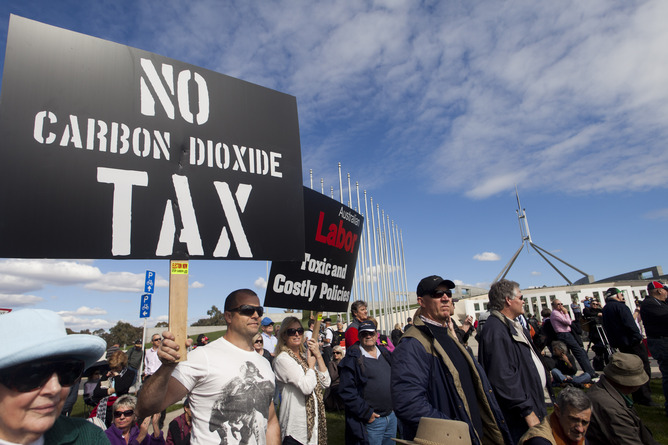 Protesters attend the Carbon Tax rally outside Parliament House, Canberra, Tuesday, Aug. 16, 2011. Opposition Leader Tony Abbott has joined around 2000 protesters calling for a fresh election and end to the carbon tax. (AAP Image/Lukas Coch)[/caption]
Protesters attend the Carbon Tax rally outside Parliament House, Canberra, Tuesday, Aug. 16, 2011. Opposition Leader Tony Abbott has joined around 2000 protesters calling for a fresh election and end to the carbon tax. (AAP Image/Lukas Coch)[/caption]





